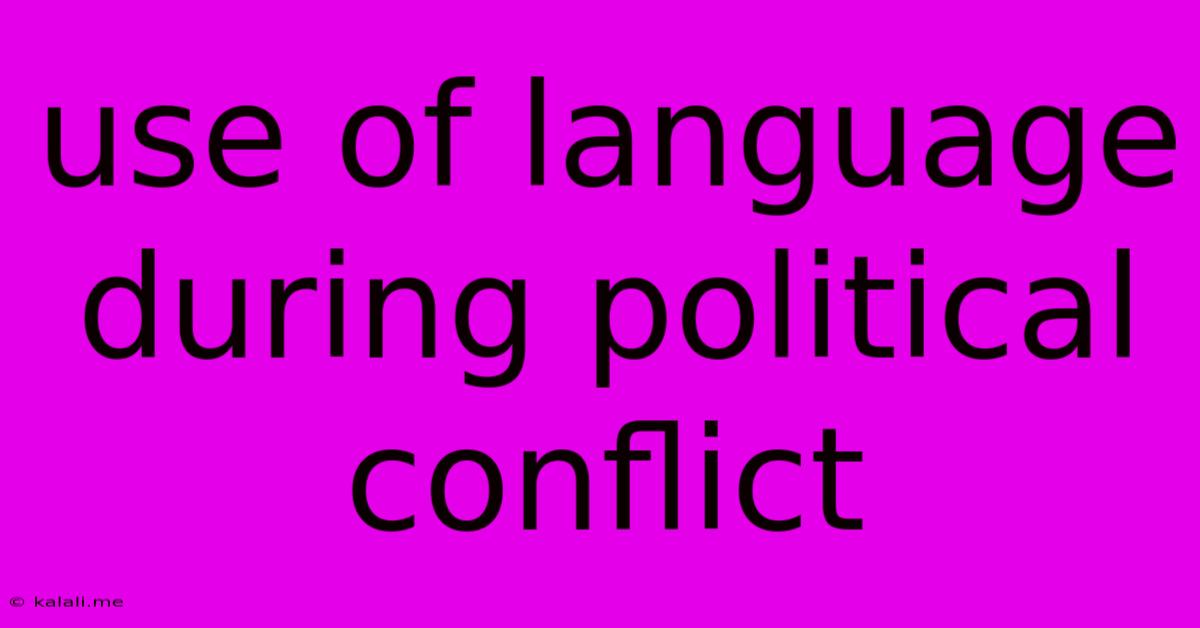Use Of Language During Political Conflict
Kalali
Jun 08, 2025 · 3 min read

Table of Contents
The Power of Words: Language Use During Political Conflict
Political conflict, whether a simmering disagreement or an outright war, is rarely fought solely with weapons. The battle for hearts and minds is often waged through the careful – or careless – use of language. This article delves into the multifaceted role of language during political conflict, examining how rhetoric shapes perceptions, fuels polarization, and ultimately influences the trajectory of events. Understanding the linguistic strategies employed during such conflicts is crucial for navigating the complexities of political discourse and fostering constructive dialogue.
Framing the Narrative: The Power of Spin
One of the most significant ways language impacts political conflict is through framing. Framing involves selecting specific words and phrases to present an issue in a particular light, shaping public perception and influencing opinions. During conflicts, competing narratives emerge, each attempting to define the situation to its advantage. For instance, one side might frame a protest as a "peaceful demonstration" while the other labels it a "violent riot." This seemingly subtle difference in language can drastically alter public sympathy and support.
- Euphemisms and Downplaying: Dehumanizing language and euphemisms are frequently used to minimize the severity of actions. Terms like "collateral damage" in the context of civilian casualties or "enhanced interrogation techniques" for torture obscure the reality of violence and suffering.
- Loaded Language: The use of emotionally charged words, such as "traitor," "terrorist," or "enemy," aims to evoke strong negative feelings towards the opposing side, fostering animosity and hindering compromise.
- Propaganda and Misinformation: The deliberate spread of false or misleading information is a powerful tool in shaping public opinion during conflict. The ease of disseminating propaganda through social media has amplified this effect, making it crucial to critically evaluate information sources.
The Role of Identity and In-Group/Out-Group Dynamics
Language plays a vital role in constructing and reinforcing group identities. During conflicts, leaders often employ language that emphasizes the uniqueness and superiority of their own group ("in-group") while simultaneously dehumanizing or demonizing the opposing group ("out-group"). This "us vs. them" mentality fuels polarization and makes compromise difficult.
- Nationalism and Patriotism: Appeals to national identity and patriotism can be powerful tools for mobilizing support during conflict, but this can also lead to xenophobia and the exclusion of dissenting voices.
- Stereotyping and Prejudice: Language frequently reinforces pre-existing stereotypes and prejudices against the out-group, creating a climate of fear and distrust. This can have severe consequences, leading to violence and discrimination.
The Impact of Media and Communication Technologies
The media plays a significant role in disseminating information and shaping public opinion during political conflict. The choice of language used by journalists and commentators can influence how the conflict is perceived. The rise of social media has further complicated this, creating echo chambers and amplifying existing biases.
- Bias and Objectivity: Maintaining objectivity in reporting conflicts is a crucial but often challenging task. The language used can subtly reflect or reinforce the biases of the media outlet, affecting public understanding.
- Information Warfare: The use of social media and other digital platforms to spread disinformation and propaganda has become a key element of modern political conflict, requiring careful scrutiny and media literacy.
Towards Constructive Dialogue: The Importance of Inclusive Language
Bridging divides during political conflict requires a deliberate shift towards more inclusive and constructive language. This involves:
- Empathy and Understanding: Focusing on understanding the perspectives of opposing groups, even if one disagrees with them.
- Respectful Communication: Avoiding inflammatory language and engaging in respectful dialogue, even when disagreements are strong.
- Promoting Critical Thinking: Encouraging individuals to critically evaluate information sources and resist the spread of misinformation.
In conclusion, language is not merely a tool for communication during political conflict; it is a powerful weapon that shapes perceptions, fuels polarization, and ultimately influences outcomes. Understanding the subtle yet significant ways language is used to manipulate, persuade, and divide is essential for navigating the complexities of political discourse and fostering a more peaceful and productive future. By promoting inclusive language and critical thinking, we can work towards constructive dialogue and build bridges across divides.
Latest Posts
Latest Posts
-
Toilets Wont Flush After Heavy Rain
Jun 08, 2025
-
How Long To Cook Pizza Rolls
Jun 08, 2025
-
Does Texting Have To Do With Sim Card
Jun 08, 2025
-
Did The Witch Of Endor Really Summon Samuel
Jun 08, 2025
-
How To Get Spray Foam Off Your Hands
Jun 08, 2025
Related Post
Thank you for visiting our website which covers about Use Of Language During Political Conflict . We hope the information provided has been useful to you. Feel free to contact us if you have any questions or need further assistance. See you next time and don't miss to bookmark.